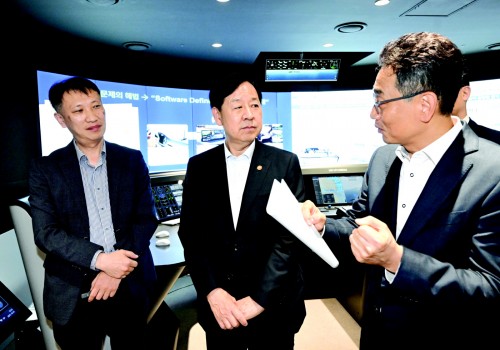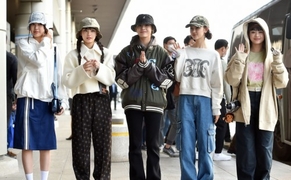 |
| Deputy Prime Minister and Finance Minister Koo Yoon-cheol (center) listens to a demonstration of autonomous vessel technology during an “AI Transformation Relay On-site Meeting” at HD Hyundai’s Global R&D Center in Seongnam, Gyeonggi Province, on October 1. / Source: Ministry of Economy and Finance |
Deputy Prime Minister and Finance Minister Koo Yoon-cheol unveiled ambitious plans for innovation in AI-powered ships and drones on October 1, calling them “game changers that will reshape the industrial landscape and a survival strategy.” The government pledged support for companies developing these technologies, with targets to achieve crewless autonomous navigation by 2030 and fully autonomous drone flight by 2031.
Koo made the remarks during an “AI Transformation Relay On-site Meeting” at HD Hyundai’s Global R&D Center in Seongnam, Gyeonggi Province, joined by leading firms and government ministries in the AI ship and drone sectors. “Companies should take the lead, and the government will provide the support they need,” Koo said, stressing the urgency of moving quickly while Korea has an edge. He suggested building demonstration centers funded by the government, with participating firms sharing ownership according to their contributions.
The market for autonomous ships—driven by AI, the Internet of Things (IoT), and other advanced technologies—is projected to grow from $102.2 billion in 2024 to $180.5 billion by 2032, a 76% increase. Korea’s government aims to secure global leadership by developing Level 3 “crewless coastal vessels” by 2030 and advancing ocean-going vessels toward Level 4 “full autonomy.”
Key initiatives include AI-based optimal route planning, predictive maintenance automation, and integrated cargo-port monitoring systems. These technologies are expected to reduce human-related maritime accidents—currently 83% of the total—cut operating costs by more than 22%, and boost logistics flows by over 10%. The government will pursue a 600 billion won ($430 million) second-phase R&D project for fully autonomous ships, exempting it from preliminary feasibility review, and launch large-scale pilot programs for coastal vessels between 2026 and 2029.
A “K-Autonomous Ship Alliance,” bringing together shipbuilders, shipping companies, and AI firms, will be launched in the fourth quarter of this year to facilitate data collection, testing, and regulatory reform. Autonomous navigation zones and regulatory sandboxes for remote operation will be expanded, while “AI-intelligent autonomous navigation technology” will be designated a national strategic technology, eligible for tax benefits of up to 50% for R&D and 30% for facility investment. Korea will also actively engage in international standard-setting at the International Maritime Organization (IMO).
For drones, the government identified five high-demand sectors—firefighting, aviation, logistics, facility management, and agriculture—as targets for comprehensive development from hardware to mission AI software. A public-private “Drone Industry Alliance” will oversee sector-specific policies, while the creation of a “Smart Drone Factory” will strengthen manufacturing capacity. A next-generation talent pipeline will also be built to support long-term competitiveness. At the same time, regulatory adjustments will make it easier to approve night and beyond-visual-line-of-sight operations and expand designated test airspaces, balancing innovation with public safety.
Most Read
-
1
-
2
-
3
-
4
-
5
-
6
-
7





















